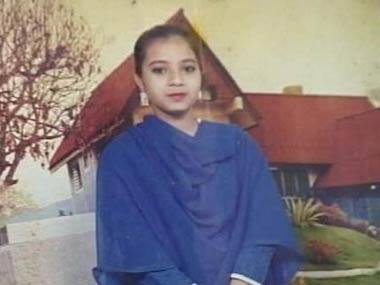Intelligence Bureau (IB) officer Rajinder Kumar who has been accused of murder by the CBI in its second supplementary chargesheet in the Ishrat Jahan fake encounter case, has said that she was part of a terror cell. Kumar also dismissed the CBI chargesheet as being ’not worth the paper it was printed on’ and told the Economic Times in an interview that “Nobody in the security establishment finds any criminality in my actions and they know that IB discharged its counter-terrorism duties with complete devotion in this matter " In its supplementary charge sheet in the encounter case, the CBI alleged that Kumar had given inputs to the Home Ministry that Ishrat was a terrorist to prove that the encounter in which the Mumbai girl was killed along with three others was a genuine one. [caption id=“attachment_1383605” align=“alignleft” width=“380”]  Image from IBNlive[/caption] However Kumar has insisted that his intelligence was genuine, and that Ishrat Jahan was indeed, part of a terror cell, despite her family’s insistence that she was just a college student. “I have sufficient evidence to prove that the CBI is false. All four of them were part of a terror plot. I have done single-handedly for the protection of national security more than most others. We are not vultures to kill or target innocent people. We are human beings. We know how to save lives. We will defend ourselves,” he told the NDTV news channel. Significantly, the claim that Ishrat Jahan was part of a terror cell is not a new one. As this _Firstpost_ article from June 2013 revealed, Ishrat Jahan had been named by none other than David Headley who was convicted in the US for helping to carry out the 26/11 Mumbai terror attacks. As the article states: “The Federal Bureau of Investigations interrogators recorded Headley as being told, included multiple strikes in Kashmir and recruiting a “female suicide bomber named Ishrat Jahaan”. Another _Firstpost_ piece a month later said: New documents obtained by Firstpost show the union government has suppressed testimony that slain Mumbai resident Ishrat Jehan Raza may have been an Lashkar-e-Taiba terrorist. In an 13 October, 2010, note, the National Investigations Agency said Lashkar-e-Taiba terrorist David Coleman Headley had told them Ishrat Jehan had been part of a “botched” operation run by the terrorist group. Later, though, mention of this revelation was removed from a 117 page record of the 26/11 surveillance agent’s interrogation released to media. CBI sources said the supplementary charge sheet, which is also the concluding one in the case unless directed by the competent court, filed by the agency this week does not go into the antecedents of Ishrat. “Nothing changes the fact that it was a joint counter terror operation of IB and Gujarat Police which was turned into a staged encounter. The antecedents of four victims does not change the fact that it was a fake encounter,” a senior CBI officer said. Other reports indicated that the CBI and centre were on a collision course over the naming of Kumar in the chargesheet. The Home Ministry was reportedly miffed that the CBI had named the IB officials without receiving proper sanction under Section 197 of the Criminal Procedure Code. Without receiving such sanction, the four officials cannot be put to trial. However the CBI was not backing down. A Telegraph report quoted an unnamed senior CBI official as saying, “We are accountable only to the court and not to the home ministry. Our officials got clinching evidence to nail Kumar and the other three IB officials. If the home ministry wants, it can deny prosecution sanction. The matter is in the court which has the final say whether it will take cognisance of the chargesheet or not”. Kumar for his part has told the Economic Times, “The whole security establishment, and not just IB, is behind me. Nobody in the security establishment finds any criminality in my actions”. The report added, “Asked if this meant the home ministry will deny CBI sanction, Kumar said: “That you will have to ask the home ministry”.
Kumar also dismissed the CBI chargesheet as being ’not worth the paper it was printed on'
Advertisement
End of Article


)

)
)
)
)
)
)
)
)



